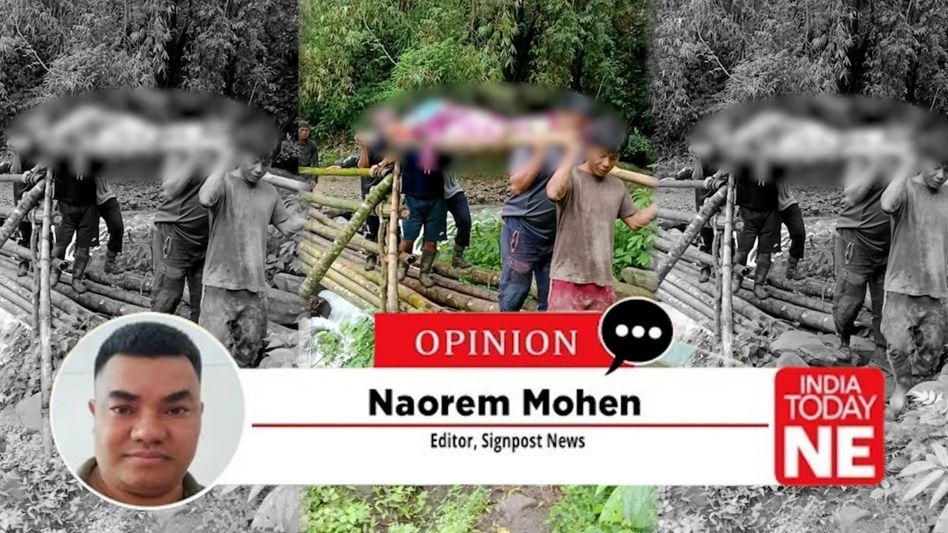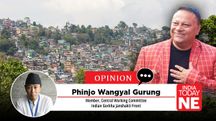Meidinliu’s Trek Exposes a Broken System in the Hills of Manipur
The viral story of Meidinliu Newmai, a 50-year-old ASHA worker from Atangkhullen village in Manipur’s Tamenglong district, has captured hearts across social media and even reached the office of Manipur’s Governor.

The viral story of Meidinliu Newmai, a 50-year-old ASHA worker from Atangkhullen village in Manipur’s Tamenglong district, has captured hearts across social media and even reached the office of Manipur’s Governor.
Her eight-hour, 28-km trek through rugged hills to deliver polio vaccines to 17 children as part of the Intensified Pulse Polio Immunization Programme has sparked an outpouring of praise.
Calls for national awards, promotions, and recognition have flooded platforms like Facebook, with users lauding her selflessness. Yet, amid the applause, a sobering truth lingers: Meidinliu’s story is not unique. Hundreds of hill residents in Tamenglong and other districts of Manipur endure similar struggles daily, grappling with abysmal healthcare, nonexistent roads, and neglected governance.
Social media has amplified Meidinliu’s story, but it risks fading without sustained action. Her trek demands more than fleeting applause—it calls for accountability, equitable development, and an end to the hill-valley divide that perpetuates suffering.
Meidinliu’s trek mirrors the daily hardships faced by residents in the district, where the absence of roads and healthcare forces communities into desperate measures. Her 28-km journey from Atangkhullen to deliver vaccines is not unique but part of a broader pattern of struggle in villages like Dunong and Njukuak.
In August 2020, Siwang, a 19-year-old pregnant woman from Dunong village in Tamei sub-division, faced a life-threatening ordeal when she went into labor. With no motorable roads, villagers cut bamboo to craft a makeshift stretcher, carrying her for over four hours across slippery, rain-soaked terrain to reach Chaton village. From there, they hired a Shaktiman truck to travel an additional 80 kilometers on a rugged, boulder-strewn road to Tamei hospital. Siwang’s husband, Bijoybou, recalled the terror of the journey: “I had the worst fear that I would lose both my wife and child, but now I’m feeling lucky.” The villagers’ kindness and sheer determination saved Siwang and her newborn son, but the ordeal underscores the dire lack of accessible healthcare and roads in Tamenglong.
Also Read: Manipur: Village chiefs from Indo-Myanmar border oppose border fencing, warn of consequences if construction continues
Similarly, on October 24, 2024, Wilamhaliu, a 35-year-old critically ill woman from Njukuak village, was carried 10 kilometers on a bamboo stretcher to reach a vehicle that could take her to a hospital in Silchar, Assam. Located 16 kilometers from the Tousem sub-division headquarters, Njukuak has no local healthcare facilities, and the road to the nearest PHC in Tousem is so degraded—especially during the rainy season—that it’s virtually impassable. Kutleing Pame, the village chairman, lamented that such emergencies are commonplace, with residents forced to endure exhausting journeys to access care.
These heart-wrenching stories rarely reach the public. Unlike Meidinliu’s viral moment, most accounts of Tamenglong’s struggles remain buried, stifled by fear of retaliation from corrupt officials, village leaders, or armed groups siphoning welfare funds. Residents who speak out risk consequences, while those in urban centers like Imphal can criticize safely. This silence enables systemic exploitation, as funds for roads, schools, and hospitals vanish, leaving communities to fend for themselves.Without photos or videos, Meidinliu’s arduous trek—carrying a heavy vaccine carrier through muddy terrain—risks fading into obscurity.
Visual evidence shapes whether such stories gain traction or remain invisible to policymakers and the public. Social media amplified Meidinliu’s journey, but without such platforms, the daily battles of carrying patients on bamboo stretchers or walking hours for services go undocumented, allowing neglect to persist.
The healthcare system in Tamenglong is a stark testament to neglect. The Tamei PHC, serving around 70 Liangmai villages, received the Kayakalp Award in 2022 for cleanliness but lacks resources to meet the region’s needs. Its recent upgrade to a Community Health Centre (CHC) is a step forward, yet it remains inaccessible to villages like Atangkhullen without roads. With no local health posts or mobile medical units, residents face perilous journeys for care, especially during the rainy season when paths become impassable. Bamboo stretchers have become a haunting symbol of this crisis.
ASHA workers like Meidinliu are the fragile backbone of this system, yet they receive no regular salary, health insurance, or logistical support. Paid through incentives, they endure physical and emotional tolls. A social media user, whose mother is an ASHA worker, shared: “I’ve walked 8-10 km uphill to deliver polio vaccines on my mom’s behalf.” Many suggest the government must provide ASHA workers with fixed salaries, transportation, and benefits to honor their vital role, but what is needed is basic amenities like roads, hospital and schools for the whole community.
The absence of roads strangles development in the district. Atangkhullen remains unconnected by motorable roads, with the Pradhan Mantri Gram Sadak Yojana (PMGSY) stopping 9 kilometers short of the village. During the rainy season, these paths become treacherous, amplifying the risks of every journey for healthcare, education, or markets. The PMGSY, meant to ensure rural connectivity, has failed Tamenglong’s hills.
Social media has called out local leaders, including the Tamei MLA, for neglecting roads, healthcare, and amenities. While former Minister Awangbow Newmai secured an oxygen plant during COVID-19 and the CHC upgrade, these efforts fall short. Corruption diverts welfare funds, leaving villages without basic infrastructure. Residents face retaliation for speaking out, perpetuating a cycle of silence and exploitation.
Meidinliu Newmai’s 28-km trek is a powerful symbol of resilience, but it’s also a damning indictment of a system that forces such sacrifices. We must not let her story fade when the next viral moment steals the spotlight. Tamenglong’s hill communities deserve more than fleeting praise—they demand roads that connect them to the world, healthcare that saves lives, and governance that serves rather than exploits.
The hill-valley divide is a wound deepened by corruption and apathy, and it’s time to hold leaders accountable. Why have good roads, bridges, and hospitals not reached the hills? If valley elites or corrupt officials are siphoning off funds meant for Tamenglong, they must be exposed and brought to justice. Playing the hill-valley divide card to dodge responsibility is cowardice. If the people of Tamenglong don’t speak up, their rights will continue to be trampled, with blame shifted to others while the real culprits escape.
Meidinliu Newmai's story is a call to action—a demand for courage, equity, and a future where no one must walk hours for a vaccine, carry a loved one on a bamboo stretcher, or live in silence to survive.
Copyright©2025 Living Media India Limited. For reprint rights: Syndications Today









